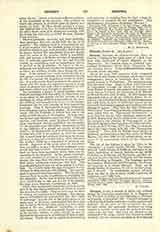

Crispina, Saint, a martyr of Africa who suffered during the Diocletian persecution; b. at Thagara in the Province of Africa; d. by beheading at Thebeste in Numidia, December 5, 304. Crispina belonged to a distinguished family and was a wealthy matron with children At the time of the persecution she was brought before the proconsul Anulinus; on being ordered to sacrifice to the gods she declared she honored only one God. Her head was shaved at the command of the judge, and she was exposed to public mockery, but she remained steadfast in the Faith and was not moved even by the tears of her children. When condemned to death, she thanked God and offered her head with joy for execution. The Acts of her martyrdom, written not long after the event, form a valuable historical document of the period of the persecution. The day of St. Crispina’s death was observed in the time of St. Augustine; in his sermons Augustine repeatedly mentions her name, as well known in Africa and worthy to be held in the same veneration as the names of St. Agnes and St. Thecla. Ruinart in his collection of the Acts of the martyrs gives the account of her examination.
GABRIEL MEIER

